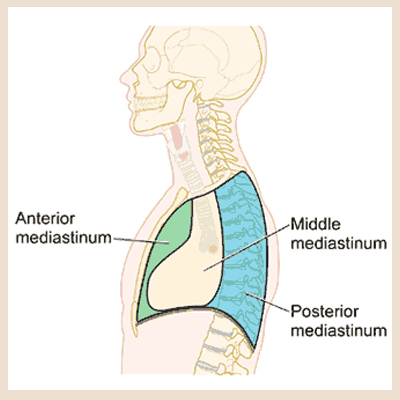

The mediastinum is the space left in the median portion of the chest by the non-approximation of the two pleura. it extends from the sternum in front to the spine behind and contains all thethorax excepting the lungs (GRAY).
A Mediastinal tumors is a tumor in this space
There are several types of mediastinal tumors, with their causes linked to where they form in the mediastinum.
Almost 40% of people who have mediastinal tumors experience no symptoms. Most of the growths are often discovered on a chest X-ray that is performed for another reason. Symptoms often result from the pressure put by the tumors onto surrounding structures, such as the spinal cord, heart or the pericardium (the heart's lining), and may include:
In general, mediastinal tumors are rare. Mediastinal tumors are usually diagnosed in patients aged 30 to 50 years, but they can develop at any age and form from any tissue that exists in or passes through the chest cavity.
The location of tumors within the mediastinum varies according to the age of the patient. In children, tumors are commonly found in the posterior (back) mediastinum. These mediastinal tumors often begin in the nerves and are typically not cancerous.
In adults, most mediastinal tumors occur in the anterior (front) mediastinum and are generally malignant (cancerous) lymphomas or thymomas
Due to their location, mediastinal tumors that are not treated can cause serious problems, even if they are not cancerous. These problems include spreading to the heart, pericardium (the lining around the heart), and great vessels (the aorta and vena cava). Tumors located in the posterior (back) mediastinum can cause compression of the spinal cord.
Homeopathy is one of the most popular holistic systems of medicine. The selection of remedy is based upon the theory of individualization and symptoms similarity by using holistic approach.
The aim of homeopathy is not only to treat symptoms but to address its underlying cause and individual susceptibility. As far as therapeutic medication is concerned; several well-proved medicines are available for treatment of mediastinum tumor symptoms that can be selected on the basis of cause, location, sensation, modalities and extension of the complaints.
For individualized remedy selection and treatment, the patient should consult a qualified homeopathic doctor in person. Some important homeopathic remedies are given below for mediastinum tumor treatment: